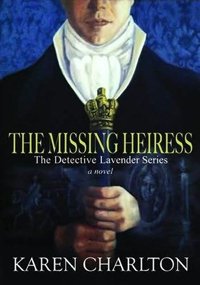
Set in Northumberland in 1809, The Missing Heiress is a spin-off novel from Charlton’s first book, Catching the Eagle, and features two of the minor characters from that tale – Detective Stephen Lavender and his good-natured sidekick, Constable Woods. This time, the pair take centre stage as they leave London and travel to Northumberland in search of a woman who has mysteriously vanished from a room locked from the inside. The lady in question, Helen Carnaby, is just weeks away from inheriting a fortune. Has she been kidnapped, or are there more nefarious reasons for her mysterious disappearance?
Locals are convinced she’s been spirited away, but Lavender has no time for such superstitious nonsense and is soon demonstrating a Sherlock Holmes-like determination in his pursuit of the truth. He’s a well-conceived character, and in Constable Woods the author has created a perfect foil. Where Lavender broods and thinks, Woods is a man who would rather deal in practicalities. In short, they’re a double act made in crime fiction heaven – and I’m sure we’ll be hearing more of them in the future.
Charlton used to write murder mystery weekends – and even won an award for her work at a country house hotel. It is a grounding which has served her well here; the plot has more than a touch of the old fashioned whodunit about it, and, in particular, the scene where Lavender reveals to an incredulous audience how the heiress got out of the locked room is worthy of Agatha Christie.
There’s plenty of historical detail to give the story an authentic feel, and the wide-ranging cast of characters are well drawn and highly believeable. Charlton is a skilled writer, and her female characters in particular do her great credit. My favourites were the mysterious gypsy girl Laura Faa Geddes, and housemaid Anna.
Charlton must have done a great deal of research in order to keep the narrative true to its period, and it is fascinating to see how times have changed. Our heroes travel up north from London to take on an investigation at the behest of a local bigwig. No county boundaries to worry about here, both carry guns – and have few qualms about using them, and there’s no such thing as forensics to help them solve the case, just a healthy dose of good old fashioned sleuthing.
It takes a lightness of touch to keep the reader intrigued without making them feel bombarded with historical context, and the author achieves this with aplomb. I’m more used to reading full-on, gory, gutsy, up-to-date crime thrillers, but it was refreshing to take things at a slower pace and immerse myself in the Regency period for a change. A most enjoyable experience.
Knox Robinson Publishing
Print/Kindle
£6.15
CFL Rating: 5 Stars